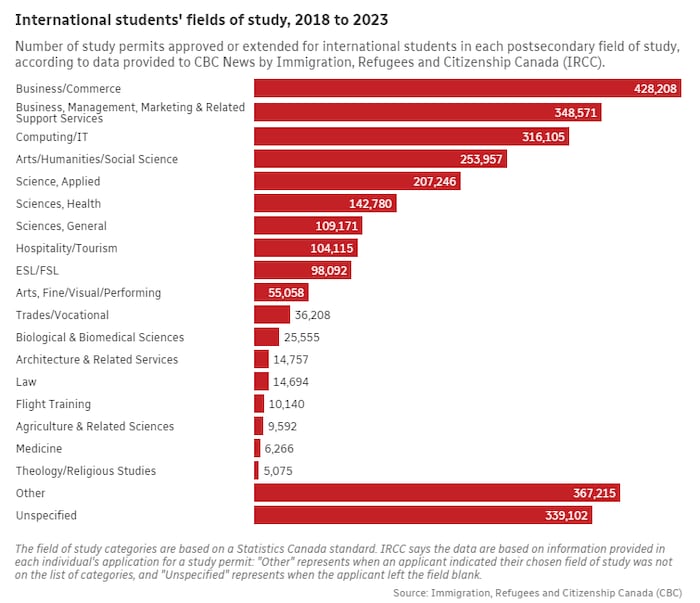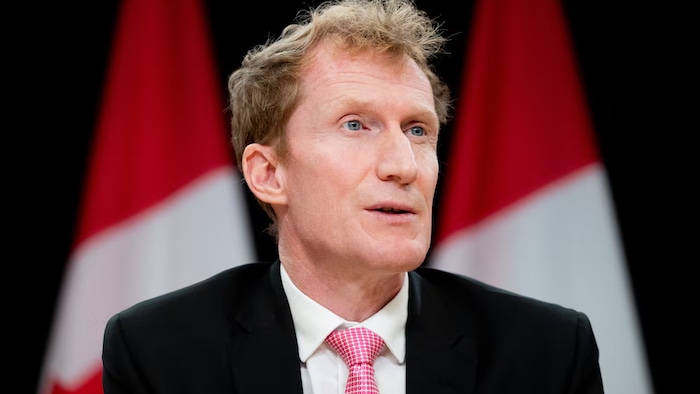- Home
- Politics
Canada’s foreign student push ’mismatched’ job market, data shows

Akash Singh, isang international student mula India, nakumpleto ang kanyang dalawang taon na business program sa isang kolehiyo sa Ontario, sa halagang $34,000. Nakakuha lang siya ng trabaho bilang security guard at fast-food worker.
Photo: CBC / Aloysius Wong
Nearly 800,000 international students got permits to study business, far more than health care or trades
Canada's recruitment of international students has tilted strongly toward filling spots in business programs, while doing little to meet the demand for workers in health care and the skilled trades, according to a CBC News analysis of federal data.
CBC obtained figures from Immigration, Refugees and Citizenship Canada (IRCC) showing the fields of education chosen by foreign students who received study permits from Ottawa to attend college or university in each year since 2018.
Experts say the figures demonstrate that neither federal nor provincial governments — nor Canadian colleges and universities themselves — focused international student recruitment squarely on filling the country's most pressing labour needs.
What we're seeing with this data is that oversight was really lacking,
said Rupa Banerjee, an associate professor at Toronto Metropolitan University who holds the Canada Research Chair in the economic inclusion of immigrants.
The figures, which have not previously been made public, show that business-related programs accounted for 27 per cent of all study permits approved from 2018 to 2023, more than any other field.
Over that same time period, just six per cent of all permits went to foreign students for health sciences, medicine or biological and biomedical sciences programs, while trades and vocational training programs accounted for 1.25 per cent.
Banerjee says the data shows far too many foreign students were lured to Canada for post-secondary programs with little prospect of a good job in an in-demand field.
Instead of really trying to bring in the best and the brightest to fill the labour market gaps that need to be filled, what we're doing is bringing in low skill, low wage, expendable and exploitable temporary foreign workers in the form of students,
Banerjee said in an interview.
Recruitment not aligned with demand for skilled workers
She says the figures point to a failure by both federal and provincial governments to ensure that international student recruitment was in line with Canada's need for skilled workers.
Students are graduating from programs that are not particularly valuable in the labour market, that are not allowing them to get the jobs that will then allow them to transition and become productive Canadian permanent residents,
Banerjee said.
The industries with the highest job vacancy rates and the largest absolute numbers of job vacancies have been generally consistent since 2018, both before and after the COVID-19 pandemic began: construction, health care and accommodation and food services, according to Statistics Canada data (new window).
Yet from 2018 to 2023, the growth in the number of international students coming to Canada for business programs far outpaced the growth in any other post-secondary field.

The field of study categories are based on a Statistics Canada standard. IRCC says the data are based on information provided in each individual's application for a study permit: "Other" represents when an applicant indicated their chosen field of study was not on the list of categories, and "Unspecified" represents when the applicant left the field blank.
Photo: Source: Immigration, Refugees and Citizenship Canada (CBC)
The number of study permits granted for programs in business management, marketing and related support services increased fivefold between 2018 and 2023. No other field of study saw anywhere near that rapid of an increase.
The number of permits granted to non-business fields increased on average 1.7 times over the same time period, according to the data. The fields of health sciences (2.6 times) and computing/IT (2.4 times) saw the next-largest increases.
Minister to raise issue Friday
Marc Miller, the federal Minister of Immigration, Refugees and Citizenship, told CBC News that he'll be raising the issue of better matching Canada's intake of newcomers to labour market needs when he meets provincial and territorial ministers responsible for immigration on Friday.
There is a responsibility of provinces in this ... to make sure that the programs that [colleges and universities] are offering to international students are the ones that fit the job market,
Miller said Tuesday on Parliament Hill.
Foreign students pay significantly higher tuition fees than Canadians and have poured billions of dollars into the country's post-secondary institutions. CBC News revealed (new window) earlier this year that the biggest drivers of Canada's sharp increase in international students were public colleges, largely in Ontario.
At the time, officials from several colleges with large foreign student enrolment told CBC News that they ramped up their international recruitment — at the urging of both federal and provincial governments — to fill the country's need for skilled workers.
International students are needed to fill employment gaps,
said a statement from Conestoga College in Kitchener, Ont., which topped the national list for international study permits in four of the past five years. Our growth over the last few years has been tied to our mission: to meet workforce demands in the communities we serve.
International students made up 70 per cent of the enrolment in Conestoga's business programs in 2021-22, according to Statistics Canada (new window).
An official from Cambrian College in Sudbury, Ont., which had a nearly fivefold increase in its international student intake between 2018 and 2023, said its recruitment mirrors and aligns with the federal government's own efforts to increase annual levels of immigration, including students, in order to meet the demand for skilled workers now and in the future.
The new data showing how many foreign students came to Canada to study business raise questions about why it happened.
Ottawa was warned about mismatch
The Trudeau government was warned about the misalignment more than a year before it finally clamped down (new window) on international student numbers.
A September 2022 report (new window) from RBC questioned whether Canada was doing enough to match its recruitment of international students with demand in the labour force.
The report described a misalignment between the study programs pursued by international students and labour market needs
and called for numbers to rise in health care, some trades and services and education.
I don't think that there was any effort or plan to match the enrolments by field of study to the needs of the labour market,
said Parisa Mahboubi, a senior policy analyst at the C.D. Howe Institute, in an interview.
IRCC approved more than 776,000 permits for students to enrol in programs classed as business/commerce
or business management, marketing and related support services
during the six-year timeframe covered by the data.
By contrast, about 143,000 study permits were issued over the same time period for programs classed as health sciences, 36,000 for trades and vocational programs and 6,300 for medicine.
Economist Armine Yalnizyan, the Atkinson Foundation's fellow on the future of workers, says there appears to have been no rhyme or reason
to the pattern of international student recruitment.
It's selling a false bill of goods to the [students] that are coming here, because we don't need that many people that have expertise in business,
Yalnizyan said in an interview.
We need much closer scrutiny of what skills we are trying to build through our post-secondary institutions,
Yalnizyan said.
As a student from India, Akash Singh paid $34,000 for a two-year business program through St. Clair College, one of Ontario's 24 public colleges. Singh studied at the college's Toronto campus, in a program delivered by Ace Acumen Academy as part of a public college-private partnership (new window) open only to international students.
Since getting his diploma in 2021, the only jobs that Singh, 22, has managed to land were as a security guard and in a McDonald's restaurant.
I thought I would do my course here, and if I get good marks, I'm going to find a good job related to that field,
Singh said in an interview.
No opportunities are here for business students,
he said. I have been trying to find jobs in finance, and it's not possible.
Singh says recruiters for Canadian colleges based in India strongly encouraged students to apply for business programs, telling them that admission to the program and jobs after graduation would be easy to obtain.
He says to his knowledge, none of the students in his cohort actually found work in business-related fields.

Immigration, Refugees and Citizenship Minister Marc Miller says he'll discuss better matching Canada's intake of newcomers to labour market needs when he meets his provincial and territorial counterparts on Friday.
Photo: La Presse canadienne / Spencer Colby
Singh's challenges in finding relevant work do not reflect what most international business students have experienced, said Ron Seguin, senior vice president international relations at St. Clair College.
It's not a story we hear often, quite honestly,
said Seguin in an interview. Those employable skills that the student learns can be applied to many sectors, and that's more the case with business than anything else.
'Fountain of money' for colleges
Alex Usher, president of Higher Education Strategy Associates, a consulting firm, says the explosive growth of international students in business programs was largely driven by colleges in Ontario seeking ways to make up for provincial underfunding.
I don't think it had much to do with labour market needs, I think what it had to do with was colleges' financial needs,
Usher said in an interview. It was a fountain of money.
He says business programs are relatively cheap to run, especially in contrast with clinical and technical courses.
With colleges charging each international student in the neighbourhood of $15,000 per academic year for such a program, a less-expensive-to-run course, such as business, leaves the school more revenue to spend elsewhere.
Usher believes the provinces deserve more of the blame than the federal government for the makeup of the international student body.
That's because the provinces have responsibility to oversee the type of programs their colleges and universities offer. Although IRCC has the role of approving study permits, the provinces have the power to limit the number of international students allowed to enrol in post-secondary programs.
Before this year's federal cap, the only province that exercised this power was Quebec, which required each international student to obtain an authorization letter from the provincial ministry of education. In other provinces, all a student needed before applying for a study permit was admission from a college or university program.
It was possible for provinces to regulate the numbers, it's just that nine out of 10 of them chose not to,
said Usher.
Ontario's Minister of Colleges and Universities Jill Dunlop was not available for an interview, but her spokesperson provided a statement.
Colleges and universities are autonomous and have the freedom to make their own decisions regarding international enrolment,
said Liz Tuomi, Dunlop's press secretary in an email to CBC News.
However, Ontario is barring international students from enrolling in one-year business/management programs while the ministry conducts a review, said Tuomi.
She said the priorities for Ontario's reduced allotment of international student permits will be programs that help prepare graduates for in-demand jobs,
including skilled trades, health human resources, hospitality, child care and the STEM fields (science, technology, engineering and math).
Marketa Evans, president and CEO of Colleges Ontario, the umbrella group representing the 24 publicly funded colleges in the province says a significant number of international students
are enrolled in programs that fill key labour market needs, including logistics, computer programming, business analytics, hospitality management, travel and tourism and culinary arts.
900 international nursing students in Ontario colleges
Students choose what programs they take, and Ontario's public colleges offer dozens of business programs that have clear labour market value,
said Evans in a statement.
Some 18,000 international students are currently enrolled in programs related to advanced manufacturing and technology, while 900 international students are enrolled in nursing, according to figures provided by Colleges Ontario.
The data obtained from IRCC show large numbers of study permits issued in which the specific field of study was labelled other (367,000) or unspecified (339,000).
IRCC officials said this is a result of how students filled in their study permit applications: other
represents when an applicant indicated their chosen field of study was not among the listed categories, and unspecified
represents when the applicant left the field blank.
Mike Crawley (new window), Valerie Ouellet (new window) · CBC News ·




